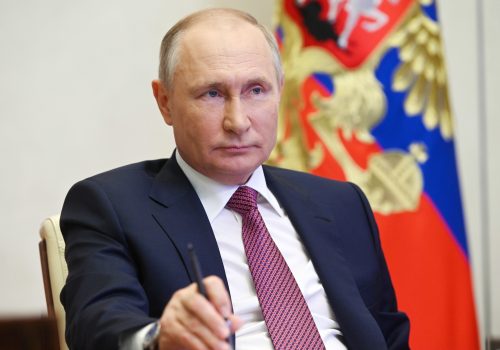FAST THINKING: Nord Stream 2 gets the green light
JUST IN
It’s no longer just a pipe dream. Berlin and Washington have ended years of political wrangling by striking a deal over the controversial Nord Stream 2 pipeline, which is slated to deliver natural gas from Russia to Germany. Critics have long argued that the project will increase Russia’s geopolitical influence across Europe while leaving Ukraine, a strategic Western partner, in the lurch. How will the United States and Germany balance business needs with security? And what price will Kyiv be forced to pay? We drilled down with our experts for answers.
TODAY’S EXPERT REACTION COURTESY OF
- John Herbst (@JohnEdHerbst): Director of the Eurasia Center and former US ambassador to Ukraine
- Daniel Fried (@AmbDanFried): Weiser Family distinguished fellow and former US assistant secretary of state for Europe and Eurasia
- Richard L. Morningstar (@ACGlobalEnergy): Founding chairman of the Global Energy Center and former US ambassador to the European Union
A win for Putin?
- Nord Stream 2 has been criticized from Eastern Europe to the halls of Congress to the White House. Why? As John tells us, the project makes it easier for Russian President Vladimir Putin to wield gas as “a geopolitical weapon” against Eastern European countries, expands Kremlin influence in Germany, deprives Ukraine of billions of dollars in gas-transit fees, and even “gives Putin more flexibility in conducting his war in Ukraine’s east as he no longer needs to worry about destroying the pipeline carrying his gas to Europe.”
- Problem is, the project is 90 percent complete, and German Chancellor Angela Merkel is set on getting it done before she leaves office this fall. So “the Biden administration judged that… killing it with US-imposed sanctions would fail and inflame relations with Germany, giving Putin a win,” Dan says.
- This was, in sum, a “calculated decision” by the Biden administration that an “agreement was far better than the pipeline being completed with no agreement,” Dick says.
Digging into the details
- The agreement includes a provision that Germany will support sanctions if Russia acts aggressively toward Ukraine, including squeezing its energy supply. “If Germany means it, that’s a big deal,” Dan says. The pact also includes $1 billion for green energy for Ukraine and financial support for regional energy-infrastructure development via the Three Seas Initiative.
- “All these ideas have merit. None is self-executing,” Dan says. “They do not solve the Nord Stream 2 problem. But they are a start and represent, finally, German recognition that they need to pitch in” to make things right.
- But Dick points out that these provisions raise a slew of related questions, including: “Will the threat of punitive actions against Russia and [its state-owned gas company] Gazprom, including new sanctions, keep Russia and Gazprom from breaching their transit agreement with Ukraine? Does Germany have the leverage to successfully negotiate an extension of the transit agreement beyond 2024? Will the US and Germany agree on what constitutes malign behavior [by Russia] and what actions are justified?”
- While John says there was a “useful passage” in the pact on preventing Moscow from using the pipeline “for geopolitical purposes,” he came away unimpressed with the details. Months of negotiations yielded “little concrete in return,” he argues, as Germany is under no obligation to take specific measures that would produce clear results.
A diplomatic dance
- While Dan thinks the US-German deal “could mitigate some of the project’s risks,” he points out that the Biden administration was playing a bad hand of its own making. The administration “seemed to give up negotiating leverage with Berlin by waiving sanctions” on Nord Stream 2, he says, and it “was slow to consult with the Ukrainians, Poles, and other Europeans who face energy pressure from Putin.”
- The White House also announced today that Ukrainian President Volodymyr Zelenskyy will visit US President Joe Biden at the White House next month—a clear attempt to salve the wounds of the Nord Stream 2 announcement.
- A joint statement by the foreign ministers of Poland and Ukraine expressed their disappointment with the US-German deal, but Dan sees a silver lining: Their statement “also makes clear that these governments are willing to work with the US and Germany going forward to deal with the Nord Stream 2 challenge and thwart Putin’s aggressive designs. It’s a start.”
- Stepping back, John looks at the broader diplomatic picture with dismay: “All this leaves the impression that an ally took the world’s leading power to the cleaners. … When Washington looks weak in talks with Berlin, what conclusions are drawn in Beijing and Moscow?”
Further reading
Fri, Jul 16, 2021
Gazprom’s folly: In seeking to deliver Nord Stream 2, it may undermine its own access to EU markets
EnergySource By Alan Riley
After six years of debate and controversy over Nord Stream 2, the pipeline is now close to physical completion. Gazprom now wants to ensure that it is not just completed, but that it also receives all EU regulatory clearances rapidly, so the pipeline can be brought online. However, issues regarding compliance with existing EU law, prospective legal challenges, and consequences of Russian geopolitical natural gas power plays may complicate that narrative.
Sat, Jul 10, 2021
Putin will use weaponized pipeline to blackmail Europe
UkraineAlert By
Vladimir Putin makes little secret of his plans to use the Nord Stream 2 pipeline as a geopolitical weapon, but will Western leaders act before the energy infrastructure project enters service in the coming months?
Tue, Apr 27, 2021
What will the impact be if Nord Stream 2 is completed?
Issue Brief By Anders Åslund
A completed Nord Stream 2 pipeline will have an impact on a number of issues, from national and energy security to geopolitical and governance considerations, all while the gas supply will hardly be impacted with costs already sunk. Does the pipeline make commercial sense?
Image: Workers are seen at the construction site of the Nord Stream 2 gas pipeline, near the town of Kingisepp, Leningrad region, Russia, on June 5, 2019. Photo by Anton Vaganov/Reuters.


